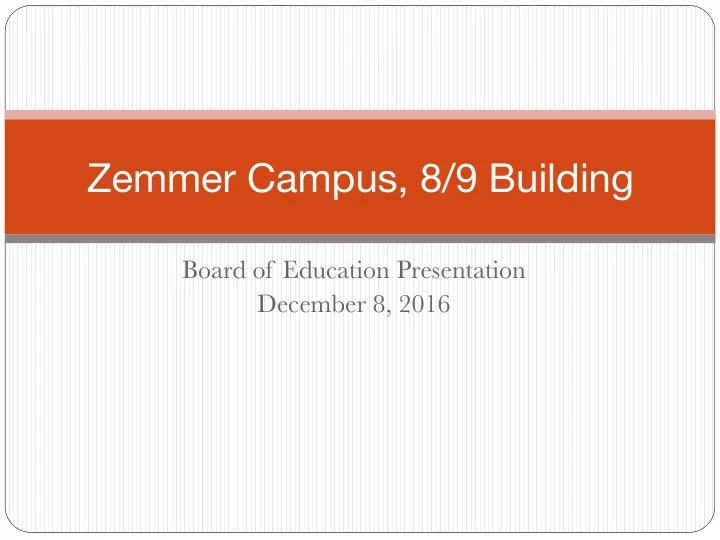

Zemmer Campus, 8/9 Building Board of Education Presentation December 8, 2016
Presenters ● Amy Maruca and Mike Hobolth ● Russ Reitz: DC Experience ● Matt Nowak: NGSS ● Beth Rupprecht: CMP3/Algebra ● PSAT
Russ Reitz: DC Experience
Next Generation Science Standards Matt Nowak Board Presentation December 8, 2016
THE THREE DIMENSIONS OF SCIENCE LEARNING ● CROSSCUTTING CONCEPTS ● SCIENCE AND ENGINEERING PRACTICES ● DISCIPLINARY CORE IDEAS
CROSSCUTTING CONCEPTS Crosscutting Concepts help 1. Patterns students explore connections 2. Cause and Effect across the four domains of 3. Scale, Proportion, and science, including Physical Quantity Science, Life Science, Earth 4. Systems and System and Space Science, and Models Engineering Design. 5. Energy and Matter in Systems When these concepts, such 6. Structure and Function as “cause and effect”, are 7. Stability and Change of made explicit for students, Systems they can help students develop a coherent and scientifically-based view of the world around them.
SCIENCE AND ENGINEERING PRACTICES Science and Engineering 1. Asking questions and defining problems Practices describe what scientists do to investigate the 2. Developing and using models natural world and what 3. Planning and carrying out engineers do to design and investigations build systems. The practices 4. Analyzing and interpreting data better explain and extend what 5. Using mathematics and is meant by “inquiry” in computational thinking science and the range of 6. Constructing explanations and cognitive, social, and physical designing solutions practices that it requires. 7. Engaging in argument from Students engage in practices evidence to build, deepen, and apply 8. Obtaining, evaluating, and their knowledge of core ideas communicating information and crosscutting concepts.
DISCIPLINARY CORE IDEAS ● Disciplinary Core Ideas (DCIs) are the key ideas in science that have broad importance within or across multiple science or engineering disciplines. These core ideas build on each other as students progress through grade levels and are grouped into the following four domains: Physical Science, Life Science, Earth and Space Science, and Engineering.
Timeline ● Michigan adopted the Next Generation Science Standards in November 2015. ● Teachers around the state of Michigan are completing the NGSX Professional Learning Series. Lapeer teachers are working on completing the 6 unit course that covers models, discussion, building a classroom culture that supports public reasoning, lesson planning, and exploring the phenomena. ● The next Series focuses on designing lessons and assessment. ● Full implementation of the Next Generation Science Standards is Fall 2019, with the first assessment in Spring of 2020.
Lapeer Community School Teachers ● Most Lapeer Community Science Teachers 8-12 will have completed Units 1-6 by the end of the 2016-2017 school year. ● The professional development started in 2015 during the school year, continued throughout the summer with a three day training by James Emerling of the Genesee ISD, and is continuing throughout this school year. ● Some teachers have completed the three week summer training on modeling and assessment and a one week summer course on the Disciplinary Core Ideas.
Sticky Water ● Engaging in argument CROSSCUTTING CONCEPTS from evidence ● Energy and Matter in ● Obtaining, evaluating, Systems and communicating information SCIENCE AND ENGINEERING DISCIPLINARY CORE PRACTICES IDEAS ● Asking questions and ● HS-PS1-2 Matter and defining problems its Interactions ● Developing and using models
Sticky Water ● How many drops of water can you fit on a penny? ● What happened? ● Why did the water make the dome?
Gallery Walk ● All boards were placed in the hallway. ● Groups read, discussed, and wrote comments on the boards. ● Students took pictures of their boards, emailed them to the teacher, discussion and model revisions took place during class. ● Nine talk moves were used throughout the process. ● Nine talk moves
Math Curriculum and Practices Beth Rupprecht Learning Coach
CONNECTED MATHEMATICS PROJECT & ALGEBRA PILOT ● Mathematical Practices ● Higher level thinking ● Mathematical “Talk” & Vocabulary ● Problem Centered ● Inquiry based
PSAT
PSAT: Going forward ● Emphasis on PSAT skills/assessment in both 8 th and 9 th grades ● Incorporation of Khan Academy into student preparation ● Continued deepening of teaching through MAISA and math programs
Thanks!
Recommend
More recommend